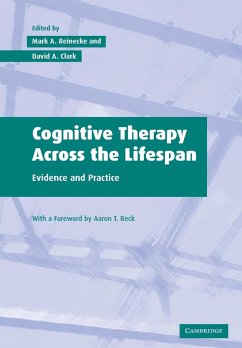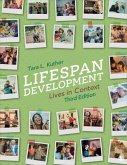Mark A. Reinecke / David A. Clark (eds.)
Cognitive Therapy over the Lifespan
Herausgeber: Reinecke, Mark A.; Clark, David A.
Mark A. Reinecke / David A. Clark (eds.)
Cognitive Therapy over the Lifespan
Herausgeber: Reinecke, Mark A.; Clark, David A.
- Broschiertes Buch
- Merkliste
- Auf die Merkliste
- Bewerten Bewerten
- Teilen
- Produkt teilen
- Produkterinnerung
- Produkterinnerung
This balanced, evidence-based overview examines the effectiveness of cognitive-behavioral therapy in clinical practice.
Andere Kunden interessierten sich auch für
![The Cambridge Handbook of Lifespan Development of Creativity The Cambridge Handbook of Lifespan Development of Creativity]() The Cambridge Handbook of Lifespan Development of Creativity170,99 €
The Cambridge Handbook of Lifespan Development of Creativity170,99 €![The Essentials of Lifespan Development The Essentials of Lifespan Development]() Tara L KutherThe Essentials of Lifespan Development122,99 €
Tara L KutherThe Essentials of Lifespan Development122,99 €![Intimate Relationships Across the Lifespan Intimate Relationships Across the Lifespan]() Abdul KhalequeIntimate Relationships Across the Lifespan86,99 €
Abdul KhalequeIntimate Relationships Across the Lifespan86,99 €![Neural Plasticity Across the Lifespan Neural Plasticity Across the Lifespan]() Gianfranco DenesNeural Plasticity Across the Lifespan215,99 €
Gianfranco DenesNeural Plasticity Across the Lifespan215,99 €![Emotional Development Across the Lifespan Emotional Development Across the Lifespan]() Linda A CamrasEmotional Development Across the Lifespan77,99 €
Linda A CamrasEmotional Development Across the Lifespan77,99 €![Developmental Transitions across the Lifespan Developmental Transitions across the Lifespan]() Leo B HendryDevelopmental Transitions across the Lifespan196,99 €
Leo B HendryDevelopmental Transitions across the Lifespan196,99 €![Lifespan Development Lifespan Development]() Tara L KutherLifespan Development145,99 €
Tara L KutherLifespan Development145,99 €-
-
-
This balanced, evidence-based overview examines the effectiveness of cognitive-behavioral therapy in clinical practice.
Hinweis: Dieser Artikel kann nur an eine deutsche Lieferadresse ausgeliefert werden.
Hinweis: Dieser Artikel kann nur an eine deutsche Lieferadresse ausgeliefert werden.
Produktdetails
- Produktdetails
- Verlag: Cambridge University Press
- Seitenzahl: 550
- Erscheinungstermin: 16. Oktober 2003
- Englisch
- Abmessung: 244mm x 170mm x 29mm
- Gewicht: 937g
- ISBN-13: 9780521533775
- ISBN-10: 0521533775
- Artikelnr.: 22083526
- Herstellerkennzeichnung
- Libri GmbH
- Europaallee 1
- 36244 Bad Hersfeld
- gpsr@libri.de
- Verlag: Cambridge University Press
- Seitenzahl: 550
- Erscheinungstermin: 16. Oktober 2003
- Englisch
- Abmessung: 244mm x 170mm x 29mm
- Gewicht: 937g
- ISBN-13: 9780521533775
- ISBN-10: 0521533775
- Artikelnr.: 22083526
- Herstellerkennzeichnung
- Libri GmbH
- Europaallee 1
- 36244 Bad Hersfeld
- gpsr@libri.de
1. Cognitive therapy across the lifespan: conceptual horizons Mark A.
Reinecke and David A. Clark; 2. Cognitive theory and therapy of depression
Ari Solomon and David A. F. Haaga; 3. Cognitive theory and therapy of
bipolar disorders Jan Scott; 4. Regulation of emotion in generalized
anxiety disorder Douglas S. Mennin, Cynthia L. Turk, Richard G. Heimberg
and Cheryl N. Carmin; 5. Cognitive theory and therapy of obsessions and
compulsions David A. Clark and Christine Purdon; 6. The cognitive model of
panic Stefan G. Hofmann; 7. Cognitive-behavioral interventions in
obsessional problems Paul M. Salkovskis and Karina Wahl; 8. Narcissistic
personality disorder Cory F. Newman and Christine L. Ratto; 9. Cognitive
therapy and the self David L. DuBois, Cristy Lopez and Gilbert R. Parra;
10. Promoting cognitive change in post-traumatic stress disorder Elizabeth
A. Hambree and Edna B. Foa; 11. Cognitive theory and therapy of social
phobia Judith K. Wilson and Ronald M. Rapee; 12. The cognitive model of
bulimia nervosa David le Grange; 13. Cognitive therapy and schizophrenia
Patrick W. Corrigan and Joseph D. Calabrese; 14. Cognitive-behavioral
interventions for alcohol abuse and dependence Helen S. Raytek, Thomas J.
Morgan and Nicola M. Chung; 15. Cognitive approaches to understanding,
preventing and treating child and adolescent depression Susan H. Spence and
Mark A. Reinecke; 16. Cognitive-behavioral interventions in childhood
anxiety disorders John Piacentini, Lindsey Bergman and Julie Wargo Aikins;
17. Cognitive-behavioral interventions in attention deficit/hyperactivity
disorder Arthur D. Anastopoulos, E. Paige Temple and Stephanie D. Shaffer;
18. Cognitive-behavioral interventions for children with conduct problems
John E. Lochman, Thomas N. Magee and Dustin A. Pardini; 19. Process of
change in cognitive therapy Sona Dimidjian and Keith S. Dobson; 20.
Cognitive therapy in the 21st century: current status and future directions
David A. Clark and Mark A. Reinecke; Index.
Reinecke and David A. Clark; 2. Cognitive theory and therapy of depression
Ari Solomon and David A. F. Haaga; 3. Cognitive theory and therapy of
bipolar disorders Jan Scott; 4. Regulation of emotion in generalized
anxiety disorder Douglas S. Mennin, Cynthia L. Turk, Richard G. Heimberg
and Cheryl N. Carmin; 5. Cognitive theory and therapy of obsessions and
compulsions David A. Clark and Christine Purdon; 6. The cognitive model of
panic Stefan G. Hofmann; 7. Cognitive-behavioral interventions in
obsessional problems Paul M. Salkovskis and Karina Wahl; 8. Narcissistic
personality disorder Cory F. Newman and Christine L. Ratto; 9. Cognitive
therapy and the self David L. DuBois, Cristy Lopez and Gilbert R. Parra;
10. Promoting cognitive change in post-traumatic stress disorder Elizabeth
A. Hambree and Edna B. Foa; 11. Cognitive theory and therapy of social
phobia Judith K. Wilson and Ronald M. Rapee; 12. The cognitive model of
bulimia nervosa David le Grange; 13. Cognitive therapy and schizophrenia
Patrick W. Corrigan and Joseph D. Calabrese; 14. Cognitive-behavioral
interventions for alcohol abuse and dependence Helen S. Raytek, Thomas J.
Morgan and Nicola M. Chung; 15. Cognitive approaches to understanding,
preventing and treating child and adolescent depression Susan H. Spence and
Mark A. Reinecke; 16. Cognitive-behavioral interventions in childhood
anxiety disorders John Piacentini, Lindsey Bergman and Julie Wargo Aikins;
17. Cognitive-behavioral interventions in attention deficit/hyperactivity
disorder Arthur D. Anastopoulos, E. Paige Temple and Stephanie D. Shaffer;
18. Cognitive-behavioral interventions for children with conduct problems
John E. Lochman, Thomas N. Magee and Dustin A. Pardini; 19. Process of
change in cognitive therapy Sona Dimidjian and Keith S. Dobson; 20.
Cognitive therapy in the 21st century: current status and future directions
David A. Clark and Mark A. Reinecke; Index.
1. Cognitive therapy across the lifespan: conceptual horizons Mark A.
Reinecke and David A. Clark; 2. Cognitive theory and therapy of depression
Ari Solomon and David A. F. Haaga; 3. Cognitive theory and therapy of
bipolar disorders Jan Scott; 4. Regulation of emotion in generalized
anxiety disorder Douglas S. Mennin, Cynthia L. Turk, Richard G. Heimberg
and Cheryl N. Carmin; 5. Cognitive theory and therapy of obsessions and
compulsions David A. Clark and Christine Purdon; 6. The cognitive model of
panic Stefan G. Hofmann; 7. Cognitive-behavioral interventions in
obsessional problems Paul M. Salkovskis and Karina Wahl; 8. Narcissistic
personality disorder Cory F. Newman and Christine L. Ratto; 9. Cognitive
therapy and the self David L. DuBois, Cristy Lopez and Gilbert R. Parra;
10. Promoting cognitive change in post-traumatic stress disorder Elizabeth
A. Hambree and Edna B. Foa; 11. Cognitive theory and therapy of social
phobia Judith K. Wilson and Ronald M. Rapee; 12. The cognitive model of
bulimia nervosa David le Grange; 13. Cognitive therapy and schizophrenia
Patrick W. Corrigan and Joseph D. Calabrese; 14. Cognitive-behavioral
interventions for alcohol abuse and dependence Helen S. Raytek, Thomas J.
Morgan and Nicola M. Chung; 15. Cognitive approaches to understanding,
preventing and treating child and adolescent depression Susan H. Spence and
Mark A. Reinecke; 16. Cognitive-behavioral interventions in childhood
anxiety disorders John Piacentini, Lindsey Bergman and Julie Wargo Aikins;
17. Cognitive-behavioral interventions in attention deficit/hyperactivity
disorder Arthur D. Anastopoulos, E. Paige Temple and Stephanie D. Shaffer;
18. Cognitive-behavioral interventions for children with conduct problems
John E. Lochman, Thomas N. Magee and Dustin A. Pardini; 19. Process of
change in cognitive therapy Sona Dimidjian and Keith S. Dobson; 20.
Cognitive therapy in the 21st century: current status and future directions
David A. Clark and Mark A. Reinecke; Index.
Reinecke and David A. Clark; 2. Cognitive theory and therapy of depression
Ari Solomon and David A. F. Haaga; 3. Cognitive theory and therapy of
bipolar disorders Jan Scott; 4. Regulation of emotion in generalized
anxiety disorder Douglas S. Mennin, Cynthia L. Turk, Richard G. Heimberg
and Cheryl N. Carmin; 5. Cognitive theory and therapy of obsessions and
compulsions David A. Clark and Christine Purdon; 6. The cognitive model of
panic Stefan G. Hofmann; 7. Cognitive-behavioral interventions in
obsessional problems Paul M. Salkovskis and Karina Wahl; 8. Narcissistic
personality disorder Cory F. Newman and Christine L. Ratto; 9. Cognitive
therapy and the self David L. DuBois, Cristy Lopez and Gilbert R. Parra;
10. Promoting cognitive change in post-traumatic stress disorder Elizabeth
A. Hambree and Edna B. Foa; 11. Cognitive theory and therapy of social
phobia Judith K. Wilson and Ronald M. Rapee; 12. The cognitive model of
bulimia nervosa David le Grange; 13. Cognitive therapy and schizophrenia
Patrick W. Corrigan and Joseph D. Calabrese; 14. Cognitive-behavioral
interventions for alcohol abuse and dependence Helen S. Raytek, Thomas J.
Morgan and Nicola M. Chung; 15. Cognitive approaches to understanding,
preventing and treating child and adolescent depression Susan H. Spence and
Mark A. Reinecke; 16. Cognitive-behavioral interventions in childhood
anxiety disorders John Piacentini, Lindsey Bergman and Julie Wargo Aikins;
17. Cognitive-behavioral interventions in attention deficit/hyperactivity
disorder Arthur D. Anastopoulos, E. Paige Temple and Stephanie D. Shaffer;
18. Cognitive-behavioral interventions for children with conduct problems
John E. Lochman, Thomas N. Magee and Dustin A. Pardini; 19. Process of
change in cognitive therapy Sona Dimidjian and Keith S. Dobson; 20.
Cognitive therapy in the 21st century: current status and future directions
David A. Clark and Mark A. Reinecke; Index.








